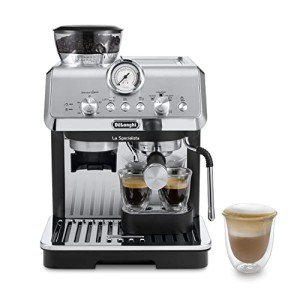10 Wrong Answers To Common Home Use Espresso Machines Questions: Do You Know The Right Ones?
Home Use Espresso Machines: A Comprehensive Guide
Espresso machines have become a staple in many households as coffee lovers look for to duplicate café-quality brews in the comfort of their kitchens. The increase in popularity has resulted in a varied market filled with numerous designs, functions, and rates. This post intends to offer a useful overview of home use espresso machines, assisting readers browse their options efficiently.
Comprehending Espresso Machines
Espresso machines work by forcing warm water through finely-ground coffee under high pressure, leading to a focused coffee beverage called espresso. There are several kinds of espresso machines categorized based upon their brewing techniques and level of automation. The most typical types consist of:
Manual Espresso Machines: These need the user to control the pressure and water flow, enabling a more hands-on coffee-making experience.
Semi-Automatic Espresso Machines: These use automatic control over water pressure, while the user by hand grinds and tamps the coffee.
Automatic Espresso Machines: With the push of a button, these machines instantly control the flow of water, making it much easier to brew espresso with consistent results.
Super-Automatic Espresso Machines: These all-in-one machines handle grinding, tampering, brewing, and even milk frothing, making them ideal for users trying to find convenience.
Pill or Pod Machines: These use pre-packaged coffee pods to develop espresso with minimal effort, but they restrict option in developing strategies and flavors.
Table: Comparison of Espresso Machine Types
Type
Control Level
Relieve of Use
Cleaning Level
Ideal For
Manual
User-controlled
Moderate
High
Coffee purists
Semi-Automatic
Partial automation
Moderate
Moderate
Home baristas
Automatic
Totally automated
Easy
Low
Hectic individuals
Super-Automatic
Totally automated
Extremely easy
Very low
Convenience seekers
Capsule/Pod
Totally automated
Extremely simple
Extremely low
Casual drinkers
Secret Features to Consider
When choosing a home use espresso machine, it's vital to consider various functions that can considerably affect the quality of espresso and user experience.
Pressure: Look for machines that supply a minimum of 9 bars of pressure, as this is thought about optimum for brewing espresso.
Boiler Systems: Single vs. dual boiler systems figure out temperature stability and the capability to brew espresso and steam milk at the same time.
Grinder: Integrated mills permit newly ground coffee, which improves taste. Think about machines with adjustable grind settings.
Milk Frother: For those who enjoy cappuccinos and lattes, a built-in steam wand or automatic frother is important.
Size and Design: Consider your kitchen space and aesthetic preferences. Machines are available in different sizes, from compact to large setups.
Rate: Home espresso machines can vary from a couple of hundred to numerous thousand dollars, so it's important to establish a budget before exploring alternatives.
Advantages and disadvantages of Home Use Espresso Machines
Pros
Cons
Convenience of brewing coffee at home
Initial investment can be high
Quality of espresso is frequently superior
Requires some skill, particularly with manual machines
Capability to experiment with flavors
Maintenance and cleansing can be labor-intensive
Can conserve cash in the long run
Not all machines will fit every coffee choice
Maintenance and Cleaning Tips
Maintaining an espresso machine is vital for prolonging its life and making sure constant brew quality. Here are some beneficial ideas:
Regular Descaling: Minerals from water can develop in the machine. Descale every 1-3 months, depending upon water hardness.
Daily Cleaning: Rinse portafilters, baskets, and steam wands after each use to prevent coffee oils from building residue.
Use Filtered Water: This can help in reducing mineral buildup and improve the taste of coffee.
Replace Gaskets and Seals: These parts might break with time and ought to be changed to keep pressure and efficiency.
Read the Manual: Each machine has particular care directions; following these will make sure durability.
Frequently Asked Questions About Home Use Espresso Machines
**Q1: What is the very best budget espresso machine?The best budget espresso machine often depends upon individual requirements, however models like the DeLonghi EC155 or the Breville Bambino are popular amongst users for offering great worth. Q2: How long do home espresso machines usually last?With appropriate upkeep, home espresso machines can last anywhere from 5 to 15 years, depending upon the quality of the machine and frequency of use. Q3: Can I make cappuccinos and lattes with any espresso machine?While most espresso machines can make coffees and lattes, having a reputable
steam wand or frother is necessary for accomplishing the best milk texture.
Q4: Are super-automatic machines worth the investment?For Retro Espresso Machines who focus on benefit and fast brewing, super-automatic machines can be worth the financial investment, though they may lack some customizability in brew strength and flavor. Q5: What types of coffee beans are best for espresso?While individual choice contributes, beans identified as” espresso “blends are generally roasted darker, developing abundant flavors and a creamy texture when brewed.
Investing in a home espresso machine can change the daily coffee routine into something unique, elevating home brews to café quality. By comprehending the different types of machines, essential features to consider, upkeep needs, and weighing the
benefits and drawbacks, customers can make educated decisions that fit their individual preferences. As the espresso culture continues to grow, no matter the option, every brew can be a tasty experience waiting to be savored.  **
**